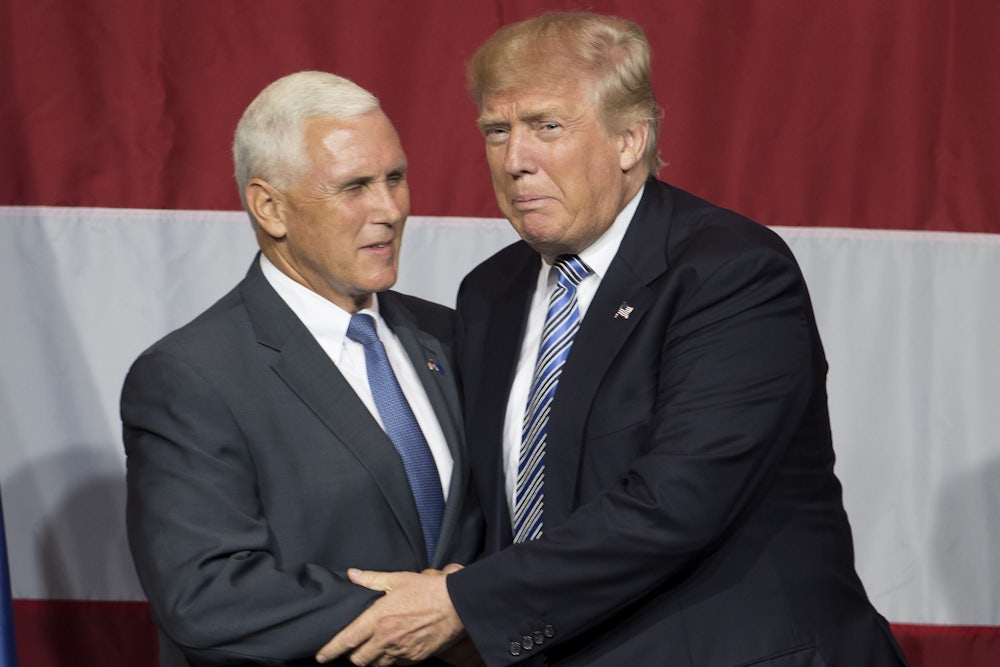President Barack Obama will leave office with historically high approval ratings, a low unemployment rate, incomes and wages rising across the country, and a record-low uninsurance rate, so it’s perversely fitting that House Speaker Paul Ryan is heralding the transition as a “dawn of a new unified Republican government.”
It is shaping up to be a dawn of some sort, but not the normal kind where things get brighter and people return to waking life.
This isn’t purely a statement of ideological foreboding, though the Republican Party will in all likelihood do significant damage to progressive functions of our government. It is also a testament to the likelihood that critical measures of political health—presidential approval, corruption, transparency—are likely to collapse very quickly after Donald Trump’s inauguration on January 20.
Trump’s transition efforts are being hobbled by infighting, retribution, and a wariness among people with experience in public service to help the incoming administration succeed. It is becoming apparent that the only hope for preserving a bare semblance of order, competence, and ethics in the new government will be if a small number of Republican senators essentially dictate acceptable figures to fill senior ranks of Trump’s administration.
There are glimmers of hope that Senate Republicans will save Trump from himself insofar as they can. The Senate GOP conference will likely enjoy a tiny 52-seat majority, which means three independently minded members can exert extraordinary influence on the staffing of Trump’s administration. Kentucky Senator Rand Paul told the Washington Post on Tuesday that he’s inclined to oppose confirming Rudy Giuliani and former U.N. ambassador John Bolton—two Trump allies who, horrifyingly, are reported to be leading candidates to serve as secretary of state. The same day, Arizona Senator John McCain warned Trump that abrupt efforts to thaw relations with Russia are “unacceptable.”
Both McCain and Paul have just been re-elected to six-year terms, and can thus exert leverage over the Trump administration without worrying about near-term political costs. But they and at least one other Republican senator would have to coordinate a highly unusual interference operation against an unconstituted administration in an abysmal state of disarray—an administration headed by a man who just benefited from a sabotage campaign against his election rival, spearheaded by a foreign government.
When Trump and his entourage met with Obama and current White House staff last week, it quickly became apparent how unprepared they were for the enormity of the tasks ahead of them. They were reportedly unaware that the West Wing was not permanently staffed, and that Trump would have to hire thousands of people to manage day to day functions of the White House and cabinet departments within two months.
As if to compound the problem, Trump then placed Vice President-elect Mike Pence in charge of the transition, tossing aside New Jersey governor Chris Christie and the weeks’ worth of prep work he did ahead of election night. This week, a “Stalinesque purge” of Christie hires and loyalists began, marked by the abrupt departure of Mike Rogers, former chair of the House intelligence committee. The shakeup has apparently ground the staffing process to a halt.
What the incoming administration needs is experienced, steady hands to take the whole process over from the rag-tag goons Trump has enlisted to run things. But the door is closed to them, and in any case, they are increasingly reluctant to knock.
During the campaign, Eliot Cohen—a neoconservative foreign policy hand who worked with Condoleezza Rice in George W. Bush’s State Department—enlisted a number of right-of-center national security experts in opposing Trump’s candidacy. After Trump won, Cohen encouraged those same experts and others to consider offering assistance to the incoming Trump administration, if only to keep the government from flying off the rails. Here’s what he said just five days later, upon reaching out to the transition team himself.
After exchange w Trump transition team, changed my recommendation: stay away. They're angry, arrogant, screaming "you LOST!" Will be ugly.
— Eliot A Cohen (@EliotACohen) November 15, 2016
Had Hillary Clinton won the election last week, it would’ve been immensely disappointing if she’d turned around and appointed Cohen and Rogers to senior positions in her administration. But Trump foes are now left to choose between an accelerationist strategy of hoping his government collapses rapidly, or a less-risky strategy of praying people with experience somehow worm their way into high-level jobs and prevent a potentially catastrophic executive branch failure.
The opportunity to avoid such a meltdown might only arrive if incompetent Trump apparatchiks take stock of the transition team’s immense dysfunction and withdraw from hiring consideration themselves. Either for this reason, or to continue pursuing multifarious efforts to fleece vulnerable people, Dr. Ben Carson has taken his name out of the running to lead any agency.
“Dr. Carson doesn’t feel like that’s the best way for him to serve the president-elect,” his adviser Armstrong Williams told Reuters. In another interview, Williams added, “Dr. Carson feels he has no government experience, he’s never run a federal agency. The last thing he would want to do was take a position that could cripple the presidency.”
Carson didn’t let his lack of experience stop him from pursuing the presidency. It stands to reason, something else is making him reluctant to serve Trump next year. But if other Trump lackeys follow Carson’s lead, either out of fear of hobbling the Trump administration or to avoid reputational damage, the questions will become who, if anyone, will be executing on Trump’s behalf on January 20; and whether Trump will continue to insist on banishing the only people who can rescue him—and perhaps the country—from disaster.
